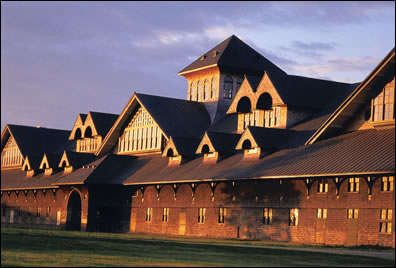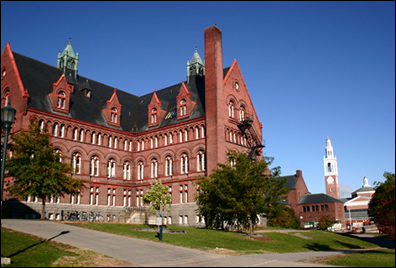

The Breeding Barn at Shelburne Farms National Historic Landmark, in Shelburne, VT, was visited by colloquium participants.
On June 22-23, 2009, the University of Vermont and the National Center for Preservation Technology and Training held a colloquium devoted to the development of curricula in historic preservation engineering. The goals of the colloquium were to develop curricula for an engineering program focused on quantitative techniques and methodologies applied to the engineering evaluation and remediation of heritage structures, and to ensure that students acquire the competencies necessary to address the challenges of the market. Undergraduate and graduate curricula were addressed across a broad engineering spectrum including sustainability, the history of engineering and technology, code development, structural analysis of existing construction and design of alterations, materials characterization, energy, heat and moisture transfer in buildings and components, fire safety of archaic assemblies, and remote monitoring platforms. It is anticipated that new curricula will include heritage preservation modules to be added to existing courses, as well as new courses focused specifically on heritage preservation engineering.
The colloquium was a two-day event, beginning with a plenary session which included presentations on:
- Engineering and Conservation Education (PDF)
- Polytechnical Education and Heritage Preservation Engineering (PDF)
- Toward a Philosophy of Preservation Engineering
- Heritage Preservation Engineering Education at the National Level (PDF)
- Local Needs for Engineers with Heritage Preservation Training (PDF)
The plenary session was followed by a series of breakout sessions, each consisting of four discussion groups working on twelve topics. Breakout discussions were organized around position papers, written by the discussion moderators. A list of these topics follows - click on a topic for the position paper presented (papers are offered here as PDF files and need Adobe Reader to view):
- NDE/Sensors/Diagnostics
- History of engineering and technology, code development
- Preservation ethics, standards, and legislation
- Sustainability (efficiency, economics, environmental physics)
- Engineering and disaster preparedness for heritage structures
- Materials, deterioration processes, and testing procedures
- Masonry/earthen structures
- Timber structures
- Stabilization, repair and treatment strategies
- Geotechnical design
- Building performance (mechanical, electrical, and other building systems)
- Documentation/recording

University of Vermont Campus, Burlington, VT.
Group discussions addressed topics with respect to the current state of knowledge; essential competencies; research questions and potential funding; experiential learning opportunities (internships, service learning projects); the addition of curriculum modules and/or new courses; and the development of new curriculum materials at the undergraduate and graduate levels.
For additional information contact:
Doug Porter
Douglas.Porter@uvm.edu
Other related documents (PDF):
Colloquium schedule
Participant list
Rapporteur guidelines
Author guidelines